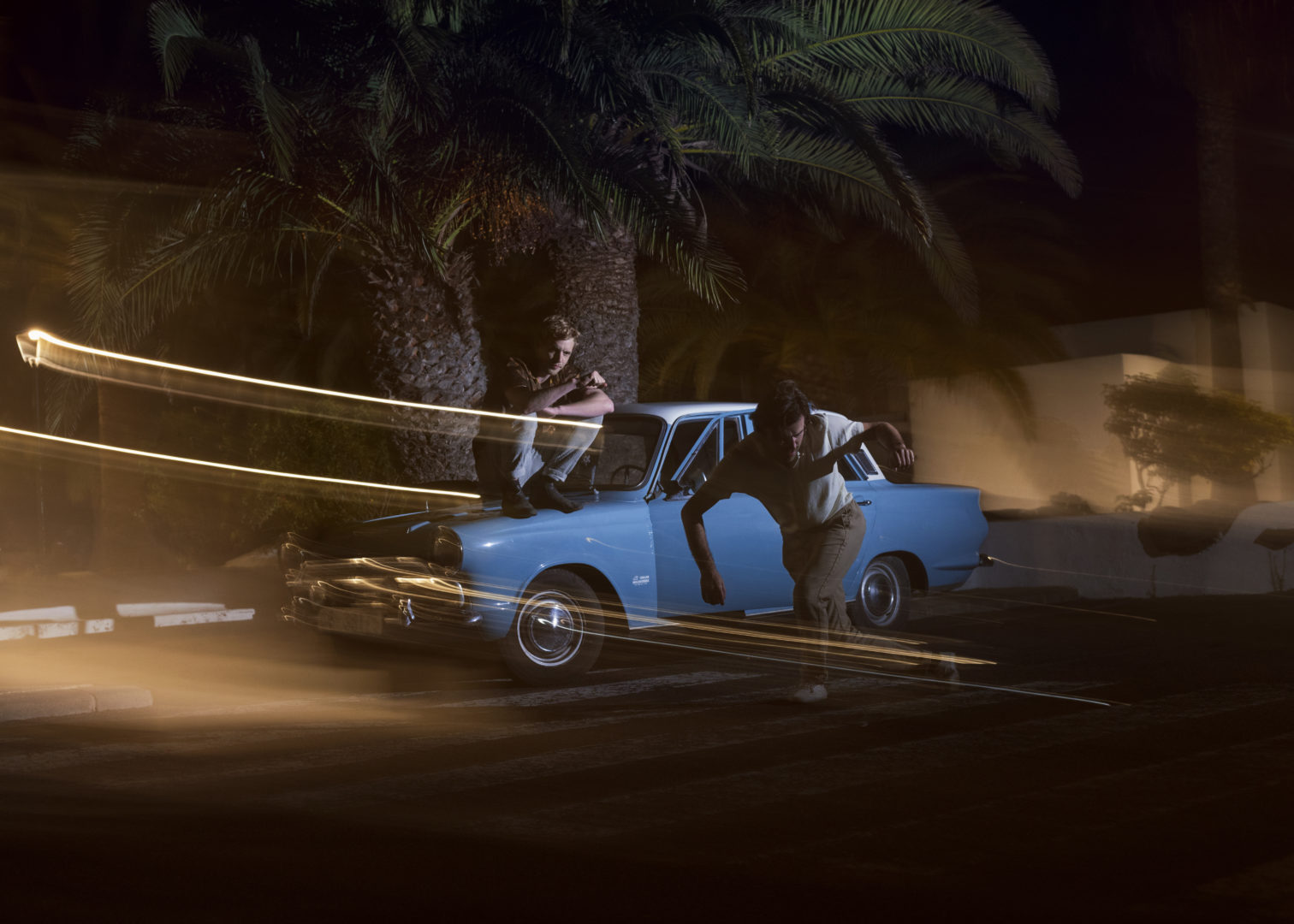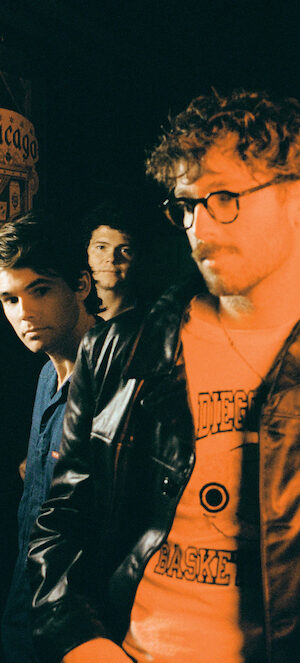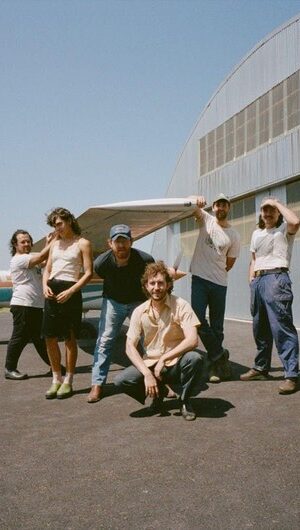TMR TALKS TO...
BALTHAZAR
In this interview feature, we get to know the most radicalist up and coming stars on the planet. This time we speak with Belgian indie pop-rock band Balthazar. In their home country of Belgium, Balthazar sell out arena stadiums. The two songwriters at the heart of the band, Maarten Devoldere and Jinte Deprez have also become well-known through their solo projects, Warhaus and J. Bernardt, respectively. It’s no wonder that after three albums, countless live shows and successful side projects that Balthazar took a breather following their third album release Thin Walls in 2015. However, the dynamic songwriting duo of Devoldere and Deprez couldn’t keep apart forever, and heading back into the studio around a year ago, the result turned into another epic album, their fourth studio record to date. Fever has been a highly-anticipated record here at TMR, with album tracks ‘Fever’, ‘Entertainment’, ‘I’m Never Gonna Let You Down Again’ and 'Wrong Vibration' all making an appearance as surefire List Picks. Since they’ve been a recurrent favourite we couldn’t miss the opportunity to talk to Balthazar’s two key members about the new album, matters of the heart, songwriting, the importance of imagery, how songs evolve through live shows and more. Here’s our interview, originally recorded backstage ahead of Balthazar’s show at Manchester’s Deaf Institute. *** TMR: Fever is your fourth album, following 2015’s Thin Walls, why was this record worth taking your time over? Jinte Deprez: We were touring from twenty-nine/ten to twenty-sixteen, so by the end of the campaign we always felt like we were touring and making albums, so we wanted to take a little break, which we did. Then we released some solo albums, which were received quite well. Yeah, the break was a little bit longer than we planned, but we got back together to write for this album a year ago, so yeah, it went quickly. TMR: Oh, so really it hasn’t taken that long to get the album together. One of the biggest themes on the album is the highs and lows of love; sometimes in your songs, the character is a heartbreaker and other times they’re heartbroken. Was this theme a purposeful choice or a product of the time you were both in? Maarten Devoldere: Well, actually I think we tend to write close to our beds, so we’ve always written love songs. It’s just the most logical theme, it fits really well in a pop song. We aren’t very politically engaged to write about that for example. JD: We are songwriters so it’s always like if one of us is heartbroken, the other one is in a totally different vibe. That way we end up with these different songs on the album. Different emotions. TMR: Would you say there are any underlying themes that would surprise a listener? For example with ‘Fever’ it's quite easy to access those feelings of love or heartbreak, but is there something beyond that? MD: Yeah, that comes across as a love song, but it’s actually more of a dialogue itself. I think because pop music has been used so much to sing about a girl or towards a girl… So we have a tradition in songwriting that if you write about addiction, for example, then maybe you’re going to dress that addiction up as a girl as well. JD: On this album it seems like we don’t make much sense or make any points, because on ‘Fever’ we sound quite harsh towards a girl, but at the same time we’re saying that we’re falling for her. I think that’s something we do a lot on this record. On the other hand, there are some songs that are really just emotion. We wrote three break-up songs, but there’s a pissed off one and a cool one. MD: Yeah, different phases. JD: Whereas in the past we tried to write about the whole relationship in one song, but we stopped doing that. TMR: Since we’re talking about the title-track ‘Fever’, there are visuals for that song as well which are quite obscure, featuring deserts, roads and mountains. How does the imagery tie in with the song? JD: When we were finishing the record, we really had to rush to meet the deadline towards the end, and then we really wanted to go on holiday. Our manager said “no you can’t go on holiday yet, because first we need the video for ‘Fever’.” And so we said, “okay, what’s the budget?” So then we went to Lanzarote on holiday and filmed there. I know it sounds super random, but I guess the vibe and the weather matched this record for us. It’s a summer record. MD: We thought of it as, like, the opening trailer of a movie, and then the album is a movie. It was mainly because we wanted to go to a sunny place. You don’t need deep reasons or to be too profound sometimes. TMR: Yeah, that makes sense, it is very cinematic and the setting definitely helps. Speaking more on visuals, why did you choose painted dogs for the album cover? JD: We were renting this house, because we were touring with our solo projects at the time, and it’s actually a pretty stupid story, but there was a National Geographic magazine which we were flipping through and then we saw that picture. It’s kind of funny, because it’s very direct and they look like a band, you know there’s a singer, and there’s a drummer looking at you. We like the picture and the colourfulness of it. With our past albums, the cover was always a bit melancholic and darker. They also work like a wolf pack, and when we’re not doing our other projects and we come back, there’s this collectiveness that we wanted to embrace. It was the first picture we had for the album, and we have a lot of photographer friends with artistic pictures, but we thought it was more funny to get a picture from a magazine. TMR: We had no idea it was from a magazine, to be honest we thought it may have been something to do with the fact that painted dogs are a matriarchy, so it’s always a female dog that’s in charge of the rest. Both: Really? JD: The thing is if you chose animals, you get to know them very well through this whole process. Well that’s perfect, yeah. TMR: Maybe there was something subconscious there? MD: That’s how music works. TMR: Switching over to the video for ‘Entertainment’, which was shot in studio. Does that reflect how Balthazar is as a band? JD: It was mainly because somebody left the band, so it was like a new collective. MD: Yeah, because the new guy was on holiday for like six months, so we flew him over, and that day when we shot the video was the first day that we were all together. We asked him to come play, he didn’t play on the record, or audition, or anything like that - it was an educated guess. That day we were play-backing the song for the video shoot and we actually had so much fun and we thought, if we have this much fun while play-backing, then it’s going to really cool if we play it live. JD: It was a little bit to emphasize the fact that we want to play live as a band. TMR: ‘Entertainment’ is quite an upbeat song as well. MD: Yeah, we wrote it at the end of the recording process, and for us, we felt like it was the jammy song that we needed, so we were really surprised when the label said that it was going to be the first single. It’s good, especially now live, we feel it really connects with the audience. It’s the enthusiasm. JD: Sometimes you work on a song for month, and that was made in a day, so for us it felt quite strange, but looking at it now, it makes sense. TMR: One of our favourite tracks on the album is ‘I’m Never Gonna Let You Down Again’. Do you each have a favourite track of your own? JD: The thing is we always make so many songs, and we pick our favourites to make the album, so in the end, all the songs are kind of our favourites otherwise it wouldn’t be on the album. MD: They kind of need each other in a way. I don’t know, it changes throughout the week, so today, it’s a Friday, so I’m going to go for... ‘Rollercoaster’. JD: For me, it’s the third day of the tour, and you start to feel like the songs are having their afterlife. They start to change in how we play them live, and it’s cool. Songs you wouldn’t expect to become your favourite song live do because they change. ‘Never Gonna Let You Down Again’ is one of the examples - live it’s really cool and I thought it would have been really hard to play live. TMR: It’s also going to depend on the audience and how they interact with the song. JD: Of course. MD: Like yesterday, there was a harmonica player in the audience, so we invited him on stage, and he did a harmonica solo in ‘Wrong Faces’. That was literally how sometimes live performance is created on the spot. But he wasn’t really that good. [all laugh] TMR: And how has the tour been so far? JD: It’s the third day and Maarten’s voice is, like, cracking already [laughs]. MD: It’s good, it’s a new album, so yeah it’s finding a connection with the old songs, planning the set list. We didn’t play together for two or three years, so it’s kind of cool, but it’s also finding your way as a band again. It’s cool to do it here [in the UK] too. Yesterday, in Brighton, it was a really intimate show, which is cool and really works for us. We’ve played here [The Deaf Institute, Manchester] before as well. Last time I fought with my manager, but he won the fight… I was really drunk, so yeah. JD: [Laughing] was that also the third day of the tour? MD: Yeah, probably. TMR: When you’re on tour, do you have a tour playlist? With songs to get you in the mood for playing live? MD: No, but yesterday, we had our support Faces On TV, who is also the producer of the record. It was the first time we could see him play live, it’s really cool, he’s all alone, but he’s this sound wizard on stage, doing way too many things on stage at the same time. It was really energetic, the perfect warm-up to our show. We also have to step up our game to make it work. JD: Yeah exactly, also our tour manager is like the DJ and he always has music you’ve never heard of. Today I discovered Onra. It’s always great to have a DJ as a tour manager. TMR: After here, where are you playing next? JD: After here, we’re going to Dublin which is cool because it’s been a while since we’ve been to Dublin. It’s cool that they haven’t forgotten us, so I’m really looking forward to that. After that, we’re going to London, to Scala, which is a beautiful venue. TMR: Are you going to be playing your home towns as well? MD: Oh yeah, we’re on tour for a month now. TMR: Do you find the atmosphere is different playing back home? JD: Well, in Belgium, we play an arena show in Antwerp, so that’s completely different from what we’re used to. MD: I’m not so keen on playing arenas, but it’s really cool to have the variation between here with smaller venues and there. TMR: Definitely different challenges in each space. Finally, what’s your plan for the rest of the year? JD: I think we’re going to play a lot. We’re going to have the European tour, take a little break, pick up the European tour. Then go to places we haven’t been before, like Mexico, the US and Canada. Then play festivals, do another tour, it’s like… yeah, we released an album, so it’s time to show the baby to the world. Fever is out now via Play It Again Sam. -Hannah Thacker
Listen



